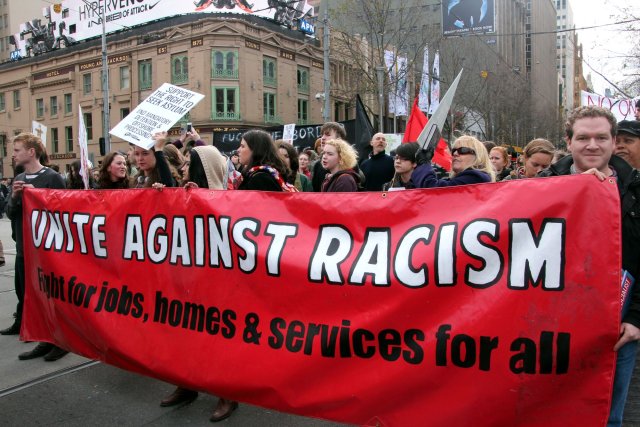
After promising not to “lurch to the right” on refugees if he returned as prime minister, Kevin Rudd dramatically did just that with his plan to send refugees to Papua New Guinea for processing and resettlement. He says no refugee who arrives by boat will ever be settled in Australia.
This is a draconian plan beyond the dreams of hardline racists like Pauline Hanson and John Howard. Yet despite this, leaders of the ALP left, such as Doug Cameron and Melissa Parke, have defended the policy.
Both piously claim to be concerned about saving lives at sea. Rudd’s policy won't do that. But it will reinforce the racist poison that is a disaster for refugees and for the ordinary Australians whose lives will be worse because of it.
So how should Australia manage refugees? Australia should first close all detention centres offshore and at home. People should be able to live in the community while their asylum claim is assessed — as was the norm before Labor introduced mandatory detention in 1992.
Second, Australia should allow refugees in countries like Indonesia and Malaysia to apply for asylum and arrange flights so that they can arrive safely without having to make a dangerous trip by sea. It should also lift visa restrictions on people from certain countries, so that if they have the means they can fly here and apply for asylum when they land.
Third, if refugees feel the need to travel to Australia by boat, any distress calls should be answered promptly with immediate rescue instead of waiting 48 hours or more, as commonly happens today.
Some people think that policies like these could never be accepted by Australian people, that Labor has to put forward a draconian policy if Abbott is to be defeated. “If you don't pander to scared racists you won't get elected in Australia,” read one mock poster in the style of the immigration department's racist ad that has done the rounds on social media.
This is not true for several reasons. Most importantly, it ignores that the Howard/Ruddock/Abbott style of refugee bashing is only credible today because Labor has never seriously challenged it — and in government they've freely accommodated to it.
Further, the hardcore rabid racist support for refugee bashing is actually a tiny minority whose influence is wildly exaggerated in the media. The reality is that most Australians can be won to an anti-racist and pro-refugee position in the right circumstances.
One important element of winning that debate is actually taking steps to solve the economic and social problems that refugee bashing is designed to distract us from. In this sense, standing up for refugee rights is standing up for justice for all workers and poor people.
How many refugees should Australia accept? We need to reaffirm that any person — without exception — who comes to Australia, appeals for asylum and is found to be a refugee should be given assistance and welcomed in the community. This is a wealthy country and we can afford to do this.
The definition of a refugee should be expanded to include people who are forced to leave their home due to economic hardship or environmental destruction.
Foreign minister Bob Carr insists “economic migrants” do not have a legitimate right to come to Australia, but people should not be forced to live in poverty and there is no surprise they would want to seek a better life for themselves. There is nothing natural about poverty. Poor countries are kept that way by global trade rules that advantage rich countries like Australia, whose corporations benefit from cheap labour and natural resources of poor countries.
When policies of the Australian government directly contribute to creating poverty, for example by implementing harsh economic sanctions on Iran, or Australian companies who destroy the environment that people depend on for their livelihoods, then Australia should not turn away people seeking to escape that.
And of course, refugees and migrants will contribute to our society and economy as has happened numerous times in the past.
What if 10 million people came to this country seeking asylum? This question is as unreal and implausible as if one were to ask: what if 3 million people presented at Royal Prince Alfred hospital's emergency department on a single day? Or what if 500,000 people rang the fire brigade because their houses were on fire?
In the immediate post-war years, Australia accepted more than 170,000 people with a population less than two fifths of today. There is more than enough capacity to assist as many refugees as conceivably would come here in the foreseeable future.
In any case, most refugees don't want to come to Australia, because they don’t want to have to leave their home in the first place. They want the problems to be addressed in their own country.
Australia could assist in achieving this goal by changing our foreign policy to end support for war and occupation in the Middle East, to end support for the Mahinda Rajapaksa regime's war crimes in Sri Lanka, to end support for Israel's apartheid policies towards Palestine.
The arguments of the government, opposition or Labor left apologists do not stand up to any serious scrutiny. Better policy alternatives than forcing refugees to an uncertain future in PNG exist.
Both for humanitarian reasons and in the interests of winning broader justice in this country, Australia should welcome refugees.
[Sam Wainwright is a Fremantle City Councillor and the Socialist Alliance candidate for the federal seat of Fremantle.]
Comments
O. Puhleez replied on Permalink
SimianSays replied on Permalink